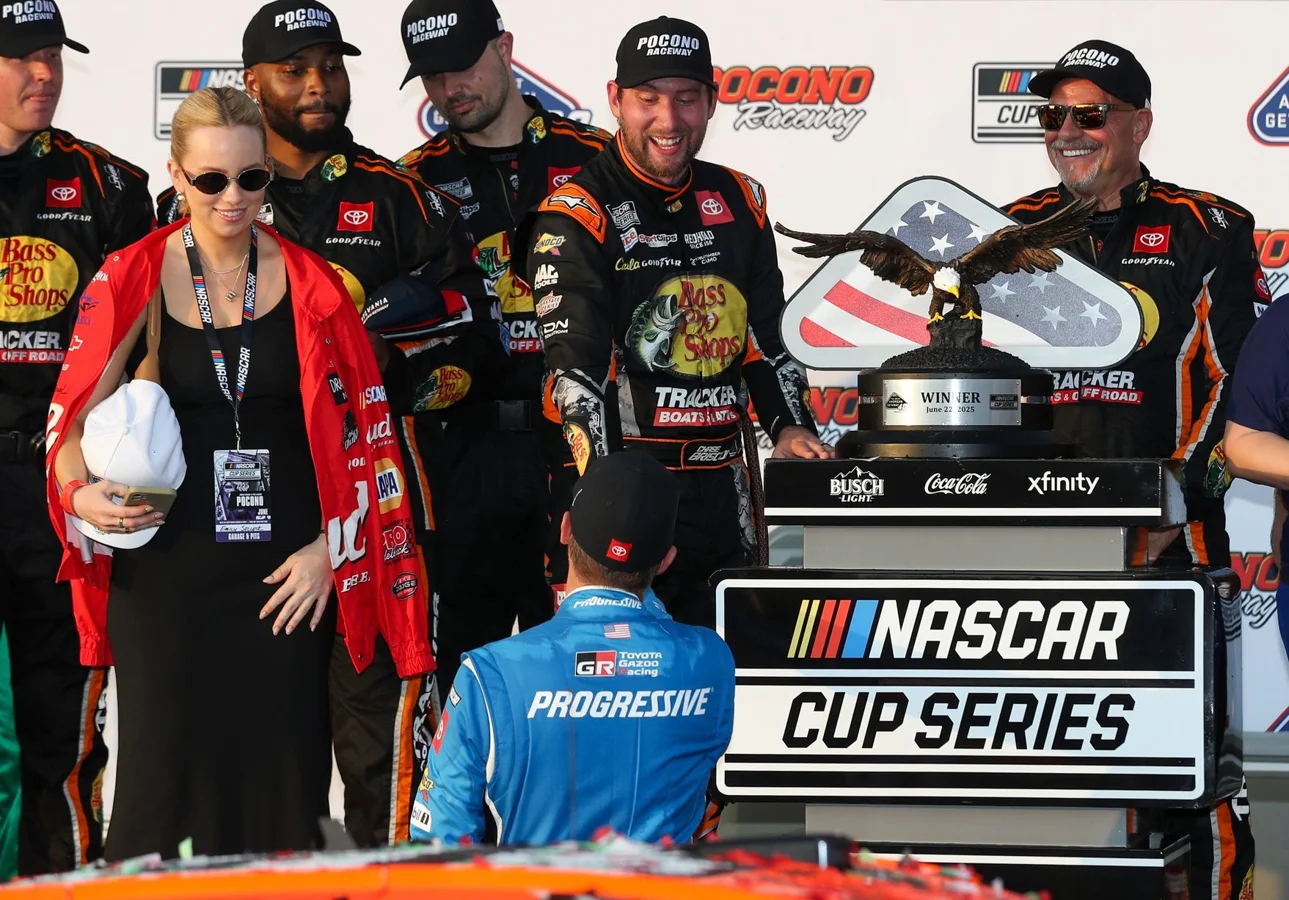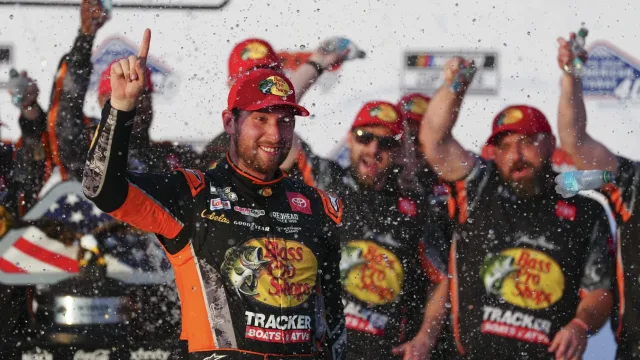Controversy has ignited around Ty Gibbs in the NASCAR world as observers question whether his career owes more to family ties than raw performance, thrusting the Joe Gibbs NASCAR nepotism debate into sharp focus. With his uneven results this season and powerful connection as Joe Gibbs’ grandson, many fans and industry insiders are openly doubting whether merit or heritage drives his continued place on the grid.
The Burden of a Racing Surname in NASCAR
Racing in NASCAR has always been a high-stakes proving ground, where drivers must constantly demonstrate excellence to survive, but those with a well-known last name face even greater scrutiny from fans and competitors alike. “Nepotism” has become a loaded term in garages and grandstands, often used to dismiss the achievements of young drivers seen as products of privilege rather than perseverance.
Harrison Burton, the son of Cup Series mainstay Jeff Burton, is a notable example. When he secured a full-time position with Wood Brothers Racing in 2022, skepticism was rampant among fans who questioned whether family connections, rather than accomplishments, earned him the seat. After finishing 27th in the standings that year and suffering multiple DNFs, Burton struggled to convince critics he belonged in top-tier competition. The discontent boiled over on social media, and despite a notable win at Daytona, his tenure ended with Josh Berry taking over his ride, highlighting the unforgiving nature of such scrutiny for legacy drivers.

Bobby Hamilton Jr. experienced similar challenges. As the son of celebrated NASCAR champion Bobby Hamilton Sr., he reached the Cup Series in 2005 only to falter soon after. Failing to qualify for multiple races and missing out on top-10 finishes, he lost his seat by the end of the season. His subsequent move to the Truck Series failed to reinvigorate his career, marking the decline of a promising lineage in the sport.
Ty Gibbs: Flashes of Potential Under a Harsh Spotlight
Into this landscape steps Ty Gibbs, the 22-year-old grandson and heir to Joe Gibbs Racing. With access to one of NASCAR’s best teams and equipment, he entered the 2025 Cup Series season surrounded by high expectations as well as suspicion. So far, Gibbs’ campaign has been a mix of disappointment and occasional brilliance. As of now, he sits 23rd in the points standings, winless and outside the playoff picture, bringing the Joe Gibbs NASCAR nepotism debate into sharper relief.
His year began on the wrong foot, missing the Busch Light Clash, then finishing 32nd at EchoPark and logging a DNF at Circuit of The Americas. Over his first eight events, Ty endured mechanical issues, poor qualifying positions—such as lining up 34th at Phoenix and 36th at EchoPark—and repeated struggles that threatened to derail his season. Only a 16th-place finish at Daytona broke him into the top 20 early on.
Despite these setbacks, flashes of the talent that won him his seat began to appear mid-season. A 13th at Martinsville led into a strong run with a ninth at Darlington and an impressive podium at Bristol, where he secured a season-best 40 points. These moments on short tracks highlighted his raw ability but were quickly overshadowed by inconsistent performances. Further stumbles included a 28th at Kansas, 24th at Charlotte, and 31st at Nashville, even when strong starts like a sixth at Texas faded by the finish. Recently, Ty has shown signs of steadiness with a third at Michigan, 11th in Mexico City, and 14th at Pocono, yet the lack of victories or playoff points continues to fuel debate.
Public Backlash and Intensified Scrutiny
As Ty Gibbs’ season unfolds, the conversation among NASCAR fans has turned pointed and at times ruthless, particularly online where speculation often gives way to resentment. A heated Reddit discussion captured the conflicted mood, with one commenter stating,
“Ty’s last name is Gibbs still, right? He’s not going anywhere. Is it brought up? Yes. Does it really matter? No. He’s still a Gibbs.”
—Anonymous Fan. This blunt assessment underscores the widespread belief that Ty’s seat with Joe Gibbs Racing is secure due to family standing rather than performance, in stark contrast to drivers like Corey LaJoie or Daniel Hemric who quickly lost their rides after lackluster results.
Other fans drew parallels with rising talents elsewhere in the sport.
“Hopefully Trackhouse sees this as a sign to not rush up Zilisch, dominate in other series doesn’t translate to Cup dominance right away.”
—Anonymous Fan. Here, the concern is that success in lower series, like that demonstrated by rookie Connor Zilisch, might not guarantee results in NASCAR’s top ranks, and that Ty Gibbs’ struggles serve as a cautionary tale for those lobbying for quick promotions.
The mood in the garage and among the fanbase reflects disappointment and high expectations unmet. Another observer noted,
“The thing with Gibbs is that it is surprising he has struggled. First half of last year was looking really good and that he’d break through. Never happened.”
—Anonymous Fan. Initial glimmers of potential—such as a podium at Bristol and third at Michigan—have not translated into consistent results, with DNFs and underwhelming finishes like 31st at Nashville reinforcing the skepticism toward his progress.
Frustration from some corners has become particularly pointed, as evidenced by another fan who declared,
“He can’t handle any adversity thrown his way. He got thrown in the absolute best equipment money could buy his whole career and now that he actually has to work and it’s not just handed to him he’s folded under the pressure. I genuinely wouldn’t be surprised to see him have a career trajectory similar to Austin Dillon.”
—Anonymous Fan. This not only questions Ty’s ability to capitalize on opportunity but also invokes comparisons to other legacy drivers perceived as not living up to organizational hopes.
Legacy, Merit, and the Road Forward
The cynicism swirling around Ty Gibbs is not new in NASCAR, but his situation shines a fresh and intense spotlight on the Joe Gibbs NASCAR nepotism debate. There is no doubt that Ty has shown moments of brilliance, challenging competitors on short tracks, and scoring respectable finishes against elite fields. Still, the overriding narrative remains that he owes much of his current position to his surname rather than outpacing rivals on race weekends.
This tension is heightened by the precedent set with other famous racing heirs like Harrison Burton and Bobby Hamilton Jr.—their careers marked by equally high hopes and equally fierce scrutiny. In NASCAR, the sport’s history is rich with second-generation drivers who have either proven or disproven the notion that legacy guarantees nothing on the track.
With a demanding stretch of regular season races ahead, Ty Gibbs stands at a crossroads. The coming weeks will test his ability to seize the moment, respond to criticism, and shift the narrative from entitlement to achievement. Whether he can break through and secure victory, or if he fades under the weight of family legacy, will define his place within both Joe Gibbs Racing and the larger story of NASCAR’s wrestling with nepotism and merit.
